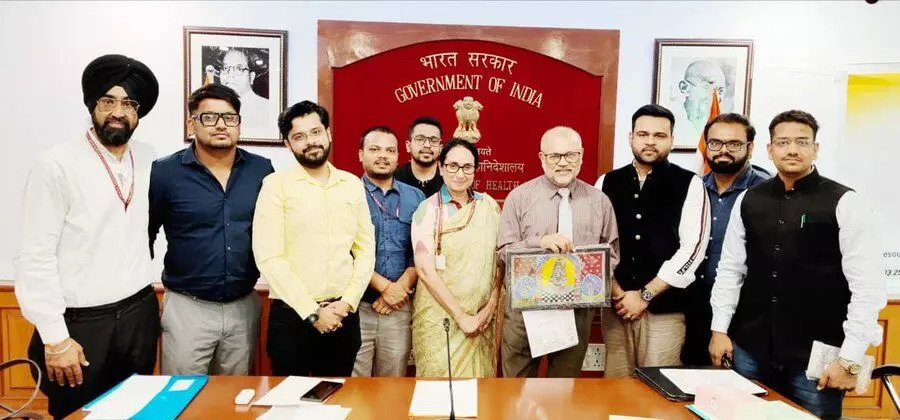FDA approves Dupixent for chronic spontaneous urticaria
Powered by WPeMatico
Powered by WPeMatico
Powered by WPeMatico
Powered by WPeMatico
Powered by WPeMatico

Mumbai: Global pharma major, Lupin Limited, has received approval from the United States Food and Drug Administration (U.S. FDA) for its
Abbreviated New Drug Application for Tolvaptan Tablets, 15 mg, 30 mg, 45 mg, 60 mg, and 90 mg.
Tolvaptan is indicated to slow kidney function decline in adults at risk of rapidly progressing autosomal dominant polycystic kidney disease (ADPKD).
Tolvaptan Tablets are bioequivalent to Jynarque Tablets, 15 mg, 30 mg, 45 mg, 60 mg, and 90 mg, of
Otsuka Pharmaceutical Company, Ltd.
As per the release, Lupin is the exclusive first-to-file for this product and is eligible
for 180 days of generic drug exclusivity.
This product will be manufactured at Lupin’s Nagpur facility in
India and will be launched soon.
“We are very pleased to have obtained approval for generic Tolvaptan from the U.S. FDA. This marks
a significant entry into the nephrology segment and demonstrates our commitment to addressing
the unmet needs of patients globally,” said Vinita Gupta, CEO, Lupin.
Tolvaptan Tablets (RLD Jynarque) had an estimated annual sale of USD 1,467 million in the U.S. (fiscal
year ended December 31, 2024).
Lupin Limited is a global pharmaceutical leader headquartered in Mumbai, India, with products distributed in over 100
markets. Lupin specializes in pharmaceutical products, including branded and generic formulations, complex generics,
biotechnology products, and active pharmaceutical ingredients. The company has a strong position in India and the U.S. across multiple therapy areas, including respiratory,
cardiovascular, anti-diabetic, anti-infective, gastrointestinal, central nervous system, and women’s health. Lupin has 15
state-of-the-art manufacturing sites and 7 research centers globally.
Powered by WPeMatico

New Delhi- The National Testing Agency (NTA) is conducting the National Eligibility and Entrance Test-Undergraduate (NEET UG) for the academic year 2025 at different locations throughout the country (552 Cities) and abroad (14 Cities) on 04 May 2025 (Sunday) from 02:00 P.M. to 05:00 P.M. in Pen and Paper mode. Through a recent notice, NTA has informed about the advance Intimation of the Examination City for the Applicants of NEET UG 2025.
The advanced Intimation of Examination City has been released on the NTA website; candidates can check/download their Examination City Intimation slip for NEET UG 2025 using the login credentials.
The Candidates must note that Examination City Intimation slip is not the Admit Card for NEET UG 2025. This is advance information for the allotment of the City where the Examination Centre will be located, to facilitate the candidates. The Admit Card of NEET (UG) 2025 shall be issued later, the notice informed.
STEPS TO DOWNLOAD NEET CITY INTIMATION SLIP
STEP 1- Visit the official website of NTA.
STEP 2- Search for the ‘Download NEET UG 2025 City Intimation Slip’ tab from the candidate activity section.
STEP 3- Enter your NEET 2025 credentials, i.e. application number and date of birth, or password.
STEP 4- Download the NEET 2025 city allotment slip and save it for future reference.
The allotment slip of the NEET-UG 2025 is an important document that mentions the exam city of the candidates. However, the NEET 2025 exam city intimation slip or advanced intimation city slip only contains the name of the exam city.
Candidates willing to appear for the said exam can download the admit card from the NTA website from May 01, 2025. The result is expected to be declared by June 14, 2025.
To view the notice, click the link below
https://medicaldialogues.in/pdf_upload/nta-neet-ug-284218.pdf
Powered by WPeMatico

Gurugram: The Haryana government has issued a show-cause notice to Medanta Hospital in Gurugram following serious allegations of violating human dignity and privacy, after a female patient on ventilator support was allegedly sexually assaulted in the hospital’s ICU.
According to the PTI report, the show cause notice to the medical director of the upscale hospital was issued by Gurugram Civil Surgeon Dr Alka Singh on the directions of Haryana Health and Family Welfare Minister Arti Singh Rao.
According to officials, the hospital has been directed to submit its reply within five working days.
A technician at Medanta Hospital has been arrested in connection with the sexual assault of patient. The incident came to light after the 46-year-old flight attendant lodged a complaint on April 14.
Also Read:Gurugram Hospital Sexual Assault Case: Accused entered patient’s cubicle thrice
The woman alleged that she was admitted to Medanta Hospital on April 5 for some treatment. The next day, a man carried out digital rape on her in the hospital ICU room, where two other nurses were also present who did nothing to stop him, she has claimed.
The show cause notice stated that according to the Charter of Patients’ Rights and Responsibilities under Section 6 of the Clinical Establishments (Registration and Regulation) Act, confidentiality, human dignity and privacy have to be observed during treatment.
Under Section 7 of the Act, the presence of a woman has to be ensured by the male doctor during the physical examination of a female patient, it said.
“In this case, both the clauses have been violated by the establishment Through the notice, it is directed that the Medanta Hospital submit its reply within five working days under Section 40 of the CEA Act (2010),” the notice read, reports PTI.
Also Read:Gurugram Hospital technician arrested for sexual assault on patient
Powered by WPeMatico

New Delhi: After introducing the Central Residency Scheme in 1992, this is the first time that the Central Government has arranged a review meeting to introduce modifications to the already existing scheme.
One of the modifications that the Government is planning to introduce is to fix the duty hours of resident doctors to 48 hours per week, a long-pending demand raised by the members of the medical fraternity, especially those working as junior and senior resident doctors in the medical colleges.
While the Director General of Health Services, Dr. Atul Goel has informed that no final decisions were made during the meeting, the National President of United Doctors’ Front (UDF), Dr. Lakshya Mittal and Chief Patron of FAIMA Doctors Association informed that the DGHS has agreed to modify the rules to clearly mention the fixed duty hours as 48 hours per week.
Also Read: After 33 years, Centre to review Residency Scheme: Here Are The Key Details
However, Dr. Atul Goel informed The New Indian Express that the Ministry would take a final call on the recommendations. “We held the first meeting today and discussed various issues. We will meet again,” Dr. Goel added.
Medical Dialogues had earlier reported that after the long wait of 33 years, the Directorate General of Health Services (DGHS) under the Ministry of Health and Family Welfare scheduled a high-level meeting to review and update the Central Residency Scheme, 1992.
Accordingly, the review meeting took place on April 22, 2025, at 2.30 pm, as scheduled and it was chaired by the newly appointed Additional Director General of Health Services (DGHS), Dr. Sunita Sharma. Directors of all major Delhi-based government hospitals, members of the Indian Medical Association (IMA), and representatives from leading resident doctors’ associations including the Federation of All India Medical Association (FAIMA), Federation of Resident Doctors Association (FORDA), Indian Medical Association Junior Doctors’ Network (IMA-JDN) and the United Doctors’ Front (UDF) also attended the meeting.
This review meeting was scheduled amid continuous demands to the Government authorities to clarify fixed duty hours for the resident doctors. The Medical Profession, especially the period of residency, is extra demanding due to the commitment required from the doctors to stay full-time present in the hospital throughout the day.
Doctors undergoing Junior Residency during the period of Postgraduate medical education complain of long work hours, low pay, almost inhuman working conditions, lack of basic necessities, and even lack of a clear structure of what is expected.
They complain that despite the efforts to address the long working hours, the police remained on pen-and-paper only. Taking cognisance of the issue, the Supreme Court, back in the 1990s, had directed for the formation of a Uniform Central Residency Scheme that would set up a defining base for all functioning of resident doctors in the country. Taking note of the same, the government formed a scheme in the year 1992. Even though the scheme addressed several issues and suggested 48-hour per week duty roster for the junior residents, allegedly, these rules remained on paper only and resident doctors were made to work for at least 70-80 hours a week. In case of a high workload, the duty hours can further be extended. The situation is worse for clinical branches, where certain weeks the work hours can even reach 100 hours.
Recently, addressing the issue, the United Doctors Front (UDF) submitted a letter to the Prime Minister, requesting for proper implementation of the Directives of the Ministry of Health and Family Welfare (MoHFW) dated 05 June 1992 for fixed duty hours of resident doctors in medical colleges/Institutions. They demanded strict enforcement of fixed duty hours for resident doctors by introducing a “Uniform Residency Scheme”.
Amid this, the review meeting was held on Tuesday. UDF National President Dr. Mittal, who was present during the meeting, informed in a press release that “We are pleased to announce that DGHS has positively responded to our demands and has agreed to clearly mention the fixed duty hours — 48 hours per week — instead of the vague term “reasonable duty hours”. This is a major step toward ensuring uniform working hours across all government and private medical colleges.”
“We also raised other key points, including the need to display the 1992 duty hour directives at all medical colleges, and the provision of at least five days of family/vacation leave annually for resident doctors — apart from the existing leave structure. Both suggestions were well received.” the release further mentioned.
Dr. Mittal further mentioned that DGHS has approved the revision of allowances, such as book, thesis and resident-related allowances, which were outdated since their 1992 fixation. UDF also proposed quarterly or six-monthly audits to monitor compliance, and while DGHS has not yet confirmed punishable clauses or enforcement mechanisms.
“If these reforms are implemented strictly and without delay, it will truly be a historic shift for the welfare of resident doctors across the country,” said Dr. Mittal. He also informed Medical Dialogues that UDF is also taking the matter to the Supreme Court for the strict implementation of the 1992 directives and accountability.
Meanwhile, the Federation of All India Medical Association (FAIMA) mentioned in its release that during the meeting, several issues, from duty hours of resident doctors to thesis grants to health benefits for resident doctors were discussed. FAIMA further mentioned in the release that many of the suggestions submitted by the association, including 48-hour per week duty hours, thesis grant for residents, salary of Assistant Professors etc, were taken up by the DGHS and officials.

The association has suggested that the duty hours for resident doctors should not be more than 48 hours a week with at least one day off every week on rotation basis. It also suggested increasing the thesis grant and announced in the release that the DGHS had agreed to increase the thesis grant of Rs 10,000 for every resident. “Best part is that it will be given to *All* the residents unanimously, so the residents will not have to follow a long procedure of applying for the grant,” the release mentioned.
Further, pointing out how currently, the salary of Assistant Professors is less than that of Senior Residents, the association mentioned that now the salary of Assistant professors will be increased to more than that of SR3. Regarding the issue of book grants for all postgraduates, the association informed that the authorities have promised to increase it by 15 thousand for the entire duration, a one-time purchase. FAIMA also suggested granting CGHS Health scheme benefits to all JRs and SRs.
Regarding the issue of provision of adequate hostel facilities for residents, the release mentioned, “At Present Hostel Facilities at Central Government Hospitals are not upto the requirements, with Hospitals like Safdarjung which has 1800 Residents and accommodation for only 700 residents makes it difficult for the residents to work in a safe and sound accommodation. D.G.H.S. Has ensured that no other building projects will be sanctioned at Safdarjung unless the Hostel upto the requirements is met.”
Commenting on the matter, Dr. Rohan Krishnan, the Chief Patron of the FAIMA, who was also present during the meeting, told Medical Dialogues, “We appreciate the government’s efforts to bring changes in the residency scheme. During the RG Kar strike, one of the demands of the FAIMA Doctors Association was that the central residency scheme, which was established in 1992, must be revised and the National task force constituted by the Supreme Court also recommended that the residency scheme should be revised. This was one of the first meeting which took place under the chairmanship of DGHS in the presence of the Directors of all the hospitals of GOI and the additional DGHS and other officials involved in framing in central residency scheme.”
“I was there, representing FAIMA as the Chief Patron and many other organisations such as FORDA, AIIMS RDA etc. attended the meeting. I think this is a very welcoming move. We hope that the new residency scheme will be much more doctor friendly catering to the basic needs of the doctors,” he added.
Meanwhile, the IMA JDN and FORDA have officially submitted their recommendations to the Union Health Minister Shri J.P Nadda on various issues after the extensive nationwide consultations with postgraduate resident doctors. A delegation from IMA JDN comprising Dr. Karan Juneja, Dr. Meet Ghonia, and Dr. Dhruv Chauhan actively participated in the meeting, presenting key insights and reiterating the need for systemic reforms to protect the academic, mental, and professional well-being of resident doctors across India.
Their recommendations revolved around regulated duty hours, elimination of clerical workload, a uniform stipend policy, mental health support systems, safety measures, and transparent academic structures. Other recommendations were given on fair leave policies, quality hostel accommodations, centralised grievance redressal, recruitment reforms, government-funded research scholarships in line with the National Education Policy, etc.
FORDA also submitted its recommendations on various issues, including duty hours, maternity leave benefits, CGHS benefits for resident doctors, Uniform bond policy, PG seat leaving penalty, leave policies, accommodations etc.
Also Read: Doctors demand fixed duty hours, urge PM Modi to end 36-hour shifts
Powered by WPeMatico

Mumbai: Holding Deenanath Mangeshkar Hospital, Pune responsible for violating multiple regulations that allow patients to get treatments in emergencies, the Maharashtra government-appointed committee has slapped a Rs 10 lakh fine on the hospital after being found guilty in connection with the tragic death of the mother of twin babies who lost her life after being denied admission due to non payment of Rs 10 lakh advance.
After collecting the Rs 10 lakh fine, the government will deposit Rs 5 lakh each as Fixed Deposits in the names of the deceased woman’s twin daughters. The girls will receive the money when they turn 18. Until then, the Chief Minister’s Relief Fund will cover all their medical expenses.
The action has been taken against the hospital after the committee, led by Joint Charity Commissioner Rajni Kshirsagar, found that the hospital violated key provisions under the Maharashtra State Public Charitable Trust Scheme by refusing to provide treatment to the woman as her family could not pay the advance deposit, which led to her unfortunate death.
Also read- Enrollment in Government Health Schemes Mandatory: Maha Govt tells Charitable Hospitals
According to the inquiry, the hospital’s refusal to provide immediate care directly violated Clause III of Maharashtra’s charitable hospital norms. These rules clearly state that hospitals cannot ask for advance payments during emergencies and must begin treatment without delay.
The committee also found that the hospital broke another important law under Section 41AA of the Maharashtra Public Trusts Act, 1950. This law requires charitable hospitals with annual expenses over ₹5 lakh to set aside 2% of their billing for an Indigent Patients’ Fund (IPF). The IPF is meant to provide free or low-cost treatment to poor patients. Investigators found that Deenanath Mangeshkar Hospital did not meet this obligation.
The inquiry committee’s report, submitted to the Chief Minister’s Office on Saturday, noted that Deenanath Mangeshkar Hospital not only failed to meet these legal responsibilities but also contributed to a tragic and avoidable loss of life, exposing serious flaws in the system meant to safeguard underprivileged patients.
The government has also directed multiple departments, including Home, law and judiciary and the corporation to initiate ‘strong action’ against doctors, employees and administration officials for alleged criminal negligence in the death of 37-year-old Tanisha Bhise last month.
The Indian Express source said, “The Deenanath Mangeshkar Hospital has been subjected to a penalty of Rs 10 lakh as punishment. Of this, Rs 5 lakh each will be kept as a Fixed Deposit for the two girls she gave birth to before she died. The amount will be handed over to the two girls when they turn 18. Till then, all expenditures incurred on their treatment will be borne by the CM Relief Fund. To ensure better planning and monitoring, central planning through the CM charity cell has been recommended.”
Deenanath Mangeshkar Hospital, a registered public charitable trust and multi-speciality facility, failed to uphold its charitable responsibilities when a gynaecologist in the hospital demanded advance payment from the families of the deceased woman before starting her treatment. Instead of providing immediate care during the critical golden hour, the doctor allegedly chose to delay treatment, and she died, leaving behind her two twin babies.
Enrollment in Government Health Schemes Mandatory
Medical Dialogues recently reported that the Maharashtra government has made it mandatory for all charitable hospitals in the state to enroll in government health schemes. These include the Mahatma Phule Jan Arogya Yojana (MPJAY), the Pradhan Mantri Jan Arogya Yojana (PMJAY), and the National Child Health Programme.
The new GR mentioned that the updated information regarding the Indigent Patient Fund (IPF) account of charitable hospitals should be updated regularly on the charity commissioner’s website. All charitable hospitals must immediately treat a patient coming to the emergency ward, including pregnant women seeking medical attention.
The GR also stated that many charitable hospitals transferred a major source of their income to external sources like pharmacy and diagnostic tests (pathology, radiology or microbiology). As a result, the main hospital’s income appeared lower, and less money was going into the Indigent Patient Fund (IPF), which is meant to support poor patients. To fix this, the government has now said that even outsourced services must contribute 2% of their yearly income to the IPF. Under the charity scheme, a hospital has to reserve 2% of the annual gross bill for the IPF account.
Why no arrest till now?
Even though the Pune police registered an FIR against the gynaecologist, who resigned from his position two weeks ago, no arrests have been made so far in connection with the case.
The Pune police took this action following a recent report submitted by the Sassoon General Hospital committee, which confirmed that the attending doctor had been negligent in handling the woman’s case. The report stated that the doctor had deliberately delayed her treatment, and this lack of timely medical intervention led to complications that ultimately caused her death.
While the doctor has been booked, he cannot be arrested now since the BNS does not mandate an arrest, said a senior police officer. Therefore, the police took a record of his detailed statements and launched an investigation in this regard.
Also read- FIR against Gynaecologist in pregnant woman’s death case
Powered by WPeMatico

New Delhi- The National Board of Examinations in Medical Sciences (NBEMS) has ended the registration for the Graduate Pharmacy Aptitude Test 2025 (GPAT) for the academic year 2025 on April 21. With this, NBEMS is going to start the correction window for GPAT 2025 soon.
NBEMS is going to open the correction window for GPAT 2025 from April 25 to 28, 2025, on the official website of NBEMS. The exam will be conducted on May 25, 2025, in a computer-based platform at various exam centres across India. Therefore, the admit card is likely to be released on May 21, and the result is expected to be released by June 25, respectively.
Meanwhile, as per the information bulletin, no new application can be registered or payment can be made during the edit window. However, the balance fee required, if any, in case of a change in candidate category and/or PwD status can be paid during the edit window. Any information/document can be changed/corrected during the edit window except for Name, Test City, Nationality, Mobile Number and Email ID. Information can be edited any number of times before the closure of the window. The last submitted information will be saved in the records.
Following this, the final Edit Window will be opened from 09th May 2025 to 11th May 2025 for the candidates to enable them to rectify the images as per image upload guidelines.
GPAT exam is a national-level entrance exam in India conducted by natboard for admission to the Master of Pharmacy (MPharm) course across the country. Its scores are accepted by many government and private universities that offer MPharm programs in their respective institutions. GPAT is a three-hour computer-based online test. Until 2018, this test was conducted by the All India Council for Technical Education (AICTE). NTA has been conducting this test since 2019.
Powered by WPeMatico
